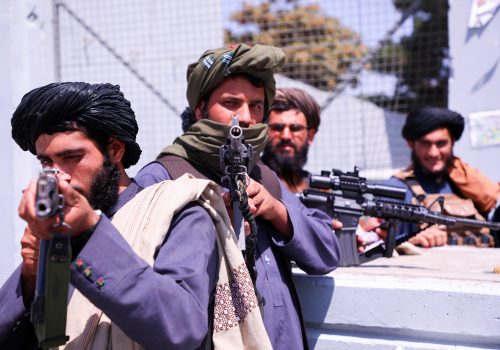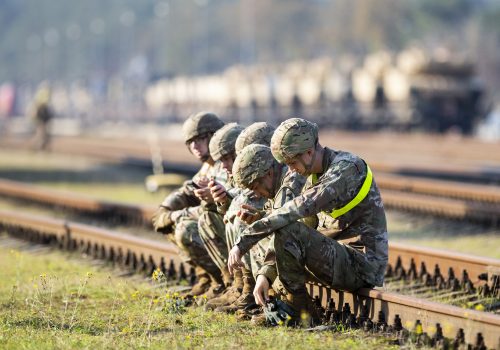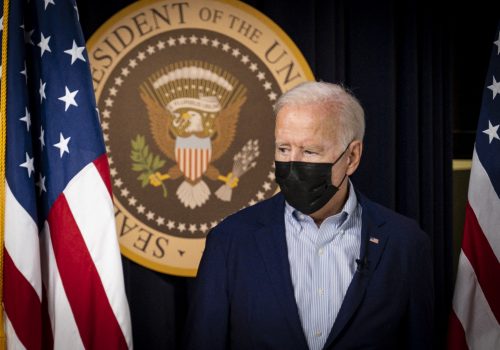The US can’t fix Afghanistan, but it can still fix NATO
Across a twenty-year war in Afghanistan, the United States’ NATO Allies contributed billions in funding and tens of thousands of soldiers, suffering more than 1,100 fatalities along the way. Even as heavy domestic opposition in NATO member countries boiled, the Alliance sustained its support to the mission. Now, Allies will face a wave of fallout that will affect the Alliance’s cohesion looking forward. It’s an American problem that will require US leadership to fix.
NATO Allies and partners are understandably smarting from the short- and long-term fallout of the Afghanistan experience. They feel bruised by these recent events and are wary of US promises. The United States will now need to commit to deeds, not words, to reassure its allies. It should closely cooperate with Allies in the event that Afghanistan once again becomes a haven for international terrorism, especially after the attack at Kabul’s airport by the Islamic State’s Afghan affiliate, ISIS-K. Now is not the time to pressure Europeans to raise defense spending higher—they already outspend Russia nearly four times over. Nor is it time to extend NATO’s reach beyond Europe. NATO already has plenty to watch, including an opportunistic and aggressive Russia. More American pressure on our European Allies to commit beyond the core focus of NATO, for example in the Indo-Pacific region, is clearly counterproductive
Here, the context is important. For some years, NATO has struggled to cope with a multitude of stressors. US pounding over defense spending, US-European Union estrangement, massive refugee flows, trade wars, withdrawal from the Paris climate accords and the Iranian nuclear deal, the pandemic and continued Russian aggression have all buffeted the Alliance. During his tenure, former US President Donald Trump’s actions seriously eroded trust and confidence between the United States and its NATO Allies. But the current crisis in Afghanistan is a heavy blow that is particularly needless. It should not be followed up with further US initiatives that disregard the national priorities of close allies or that dramatically reorient the Alliance’s focus without due consultation in NATO.
Subscribe for events and publications on transatlantic security
Sign up for updates from the Atlantic Council’s Transatlantic Security Initiative, covering the debate on the greatest security challenges facing the North Atlantic Alliance and its key partners.
The prevailing narrative in Washington framed two paths for the United States and its involvement in Afghanistan: a “forever war” or a complete and abrupt withdrawal. In reality, there was a clear middle ground. From mid-2020 to just before US President Joe Biden announced the United States’ withdrawal, NATO coalition casualties were very low, Afghan forces were successfully fending off Taliban attacks, and NATO seemed well able to afford the mission’s financial burden. Domestic constituencies largely accepted a low-level coalition presence in Afghanistan composed of advisers, logistics contractors, a small footprint of special forces, and intelligence and air-power assets. This approach was the third path, the one ignored by Washington.
To be sure, the campaign was never pristine or ideal. Epic corruption sapped the vitality of Afghan institutions, while the determination to make a western-style Afghan military was always problematic. But it denied terror a safe haven for a generation and, with continued, low-level coalition presence, could have done so for much longer, while providing time for children to get educations, women’s rights to gain a firmer foothold, political institutions to mature, and civil society to continue to move along the path toward genuine democracy.
But Washington didn’t see the alternatives, and as Biden’s August 31 withdrawal deadline came and went, a crisis ensued. A prudent approach would have prioritized evacuating civilians, nongovernmental organizations, and Afghans who had worked closely with the NATO coalition. Remaining US and NATO military contingents could have then fallen back into regional hubs or to Kabul for final evacuation, supported by NATO air power. Instead, military forces left first, prompting an immediate—and predictable—collapse of the Afghan security forces. The result was little short of chaos, likely leading to severe and lasting aftereffects.
While not opposed to a careful and deliberate withdrawal, many NATO members had supported the campaign for years and expected to be consulted early and in detail. That did not happen. The resulting debacle placed citizens of many NATO countries and Afghan partners on the ground at grave risk, damaged the credibility of the Alliance, encouraged dangerous adversaries like China and Russia, and further eroded NATO cohesion. Key Allies faced a storm of political unrest at home. While none of this may have been intentional, flawed White House assumptions about the durability of stand-alone Afghan institutions and a largely unilateral US approach to disengagement created a crisis that has spread not only regionally but globally.
What now follows could be ugly and tragic. Confidence that the Taliban will keep to its commitments is low, while retribution against Afghans who supported the coalition will probably be swift and ruthless. The prospect of US and allied citizens being held hostage is a nightmare scenario that will defy effective solutions. Most of this was avoidable.
Some commentators have blamed Allies for the sins committed in planning and executing the mission in Afghanistan. National caveats, indecision, changes in government and bouts of parliamentary opposition across NATO members, and many other factors played a role. And while much of the time, US leaders were frustrated by the unwillingness of allied leaders to align completely with US preferences and perspectives, that expectation was unreasonable. While sympathetic to the tragedy of 9/11, and in most cases willing to contribute in Afghanistan, Allies were not direct targets. Indeed, some wound up paying a heavy price for joining the fight against terrorism, enduring costly attacks at home and suffering hundreds of casualties in the field. The crisis in Kabul today cannot be laid at their feet. This is principally an American problem, arising from American choices.
The United States must lead in mending fractured relationships between Allies on the basis of mutual respect and understanding. Closer coordination and due consideration for national interests and political constraints is a good start. Beyond ingraining these aspects into US interactions with our allies, the United States must stop its controversial advocacy for defense-spending increases and its push for NATO to commit forces outside of the European theater. NATO—a pillar of US-led national security and of global stability for seven decades—has been through a lot and cannot withstand many more such blows. The US approach to NATO must change if the Alliance is to endure and succeed.
Richard D. Hooker, Jr. is a nonresident senior fellow with the Atlantic Council. He previously served as special assistant to the president and senior director for Europe and Russia on the US National Security Council. He also served as dean of the NATO Defense College.
This piece is a part of the Atlantic Council’s Transatlantic Speaker and Research Series. This Series focuses on strengthening the transatlantic alliance and shaping policy debates through timely analysis and events focused on key transatlantic security and defense issues.
Further reading
Image: A US Marine provides security for qualified evacuees boarding a US Air Force C-17 Globemaster III in support of the noncombatant evacuation operation at Hamid Karzai International Airport in Kabul, Afghanistan on August 24, 2021. Photo via US Air Force/Senior Airman Taylor Crul and Reuters.


